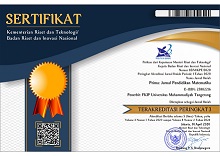EFFORTS TO IMPROVE MATHEMATICAL CREATIVE THINKING OF SMK STUDENTS IN 2023 BY USING A PROBLEM-BASED LEARNING MODEL ASSISTED BY QUIZIZZ
Abstract
This research is classroom action research (PTK) which aims to increase efforts in students' creative thinking abilities through the application of the Problem Based Learning (PBL) model in class X-DKV SMK MALAKA in the 2022/2023 Academic Year. The subjects of this research were 37 students from class The results of this research are: a) Students who have very creative criteria; b) Students who have creative criteria; c) Students who have the criteria to be creative enough; d) Students who have less creative criteria; e) Students who have criteria for not being creative. The results of the initial test show that students have criteria for not being creative with an average score of 57.16. After receiving lessons given through the Problem Based Learning learning model, students showed increased creative thinking abilities. This is shown by comparing Cycle I with Cycle II, or by comparing the initial stage of Student Ability Tests. These two comparisons show that, no student can achieve the goal at their current level of creative thinking ability. In cycle I, the overall student success rate was 49% (18 of the total students), with an average score of 63.51. In cycle II, the percentage of successful students increased to 81% (30 of the total students), with an average score of 86.89.
Keywords
Full Text:
PDFReferences
Abdurrozak, R., & Kurnia Jayadinata, A. (2016). Pengaruh Model Problem Based Learning Terhadap Kemampuan Berpikir Kreatif Siswa pada Pembelajaran IPA. Papanda Journal of Mathematics and Science Research, 1(1), 49–56. https://doi.org/10.56916/pjmsr.v2i1.306
Aminy, M., Herizal, H., & Wulandari, W. (2021). Penerapan Model Problem Based Learning Berbantuan Geogebra Untuk Meningkatkan Kemampuan Berpikir Kreatif Matematis Siswa Sma Negeri 1 Muara Batu. Jurnal Pendidikan Matematika Malikussaleh, 1(1), 45. https://doi.org/10.29103/jpmm.v1i1.4390
Anwar, C., Saregar, A., Yuberti, Y., Zellia, N., Widayanti, W., Diani, R., & Wekke, I. S. (2019). Effect size test of learning model arias and PBL: Concept mastery of temperature and heat on senior high school students. Eurasia Journal of Mathematics, Science and Technology Education, 15(3). https://doi.org/10.29333/ejmste/103032
Apriliani. (2016). Analyze of Mathematical Creative Thinking Ability Based On Math Anxiety in Creative Problem Solving Model with SCAMPER Technique. 2016.
Ed, W. P., Sirait, K. A. H., & Firdaus, M. (2023). Penerapan Model Problem Based Learning untuk Meningkatkan Kemampuan Berpikir Kreatif Siswa di Kelas VII SMP Negeri 3 Medan. Paradikma: Jurnal Pendidikan Matematika, 123–128.
Ikromi, S. L. (2018). Meningkatkan Kemampuan Berpikir Kreatif Matematis Siswa SMA Melalui Pembelajaran Open-Ended Pada Materi SPLTV. Jurnal Matematika Statistika Dan Komputasi, 15(2), 104. https://doi.org/10.20956/jmsk.v15i2.5719
Indayanti, Y., & Sagala, P. N. (2023). Penerapan Model Problem Based Learning Berbantuan Media Geogebra Untuk Meningkatkan Kemampuan Berpikir Kreatif Matematis Siswa di MTs Citra Abdi Negoro. Journal of Student Research (JSR), 1(3), 245–259.
Jihan, J. R., & Hendriana, B. (2023). Application of ADDIE Learning Model Assisted by Desmos Application to Improve Ability to Understand Mathematical Concepts. JTMT: Journal Tadris Matematika, 4(02), 181–189. https://doi.org/10.47435/jtmt.v4i02.2043
Juwita, R., Utami, A. P., & Wijayanti, P. S. (2019). Pengembangan Lks Berbasis Pendekatan Open-Ended Untuk Meningkatkan Kemampuan Berpikir Kreatif Matematis Siswa. Prima: Jurnal Pendidikan Matematika, 3(1), 35. https://doi.org/10.31000/prima.v3i1.814
Kreatif, K. B., Handayani, A., & Koeswanti, H. D. (2021). Jurnal basicedu. 5(3), 1349–1355.
Miria, Y., Fahriza, N., & Nizarwati, N. (2022). Peningkatan Kemampuan Berfikir Kreatif Melalui Model Problem Based Learning. AKSIOMA: Jurnal Program Studi Pendidikan Matematika, 11(4), 3662. https://doi.org/10.24127/ajpm.v11i4.5814
Mulyati, S., & Evendi, H. (2020). Pembelajaran Matematika melalui Media Game Quizizz untuk Meningkatkan Hasil Belajar Matematika SMP. GAUSS: Jurnal Pendidikan Matematika, 3(1), 64–73. https://doi.org/10.30656/gauss.v3i1.2127
Nitbani, A. Y., Nahak, S., & Amsikan, S. (2020). Efektivitas Model Pembelajaran Berbasis Masalah Ditinjau Dari Hasil Belajar Matematika Pada Siswa Kelas Vii Smpk Putra St. Xaverius Kefamenanu Tahun Ajaran 2019/2020. MATH-EDU: Jurnal Ilmu Pendidikan Matematika, 5(1), 25–30. https://doi.org/10.32938/jipm.5.1.2020.25-30
Salsabila, U. H., Habiba, I. S., Amanah, I. L., Istiqomah, N. A., &
Difany, S. (2020). Pemanfaatan Aplikasi Quizizz Sebagai Media Pembelajaran Ditengah Pandemi Pada Siswa SMA. Jurnal Ilmiah Ilmu Terapan Universitas Jambi|JIITUJ|, 4(2), 163–173. https://doi.org/10.22437/jiituj.v4i2.11605
Simanjuntak, I. (2023). Penerapan Model PBL Untuk Meningkatkan Kemampuan Berpikir Kreatif Matematis Siswa di Kelas XII IPA 2 SMA Negeri 7 Medan. Paradikma: Jurnal Pendidikan Matematika, 15(2), 156–160.
Subekti, F. E., & Jazuli, A. (2020). Peningkatan Kemampuan Pemecahan Masalah dan Kemandirian Belajar Mahasiswa Melalui Pembelajaran Berbasis Masalah. 4(1), 13–27.
Sukmawati, R. (2019). MATEMATIS SISWA SMP DENGAN MODEL TREFFINGER memecahkan masalah , membantu siswa dalam menguasai konsep-konsep materi yang model Treffinger ?”. 3(1), 17–23.
Vera, M., & Astuti, S. (2019). Siswa Melalui Model Pembelajaran Problem Based Learning Pada Kelas Vsdn. 6(1), 11–21.
Widiyanto, J., & Yunianta, T. N. H. (2021). Pengembangan Board Game TITUNGAN untuk Melatih Kemampuan Berpikir Kreatif Matematis Siswa. Mosharafa: Jurnal Pendidikan Matematika, 10(3), 425–436. https://doi.org/10.31980/mosharafa.v10i3.997
DOI: http://dx.doi.org/10.31000/prima.v8i2.10854
Article Metrics
Abstract - 774 PDF - 572Refbacks
- There are currently no refbacks.
Prima: Jurnal Pendidikan Matematika
Program Studi Pendidikan Matematika
Fakultas Keguruan dan Ilmu Pendidikan
Universitas Muhammadiyah Tangerang
Jl. Perintis Kemerdekaan I/33, Cikokol
Kota Tangerang, Indonesia
e-mail: primajpm@gmail.com
Prima: Jurnal Pendidikan Matematika (p-ISSN: 2579-9827 | e-ISSN: 2580-2216) is licensed under a Creative Commons Attribution 4.0 International License.







